25 Classic British Last Names You’ll Love to Use
When you think about classic British last names, have you ever considered how much they can reflect your identity? Names like Smith and Johnson carry historical weight, while others, such as Williams and Brown, offer a charm that resonates today. Each surname you encounter tells a story, connecting you to a rich tapestry of culture and heritage. As you explore these options, you might find one that feels particularly right for you. But which names stand out the most, and what hidden meanings do they hold? Let's uncover that together.
Smith
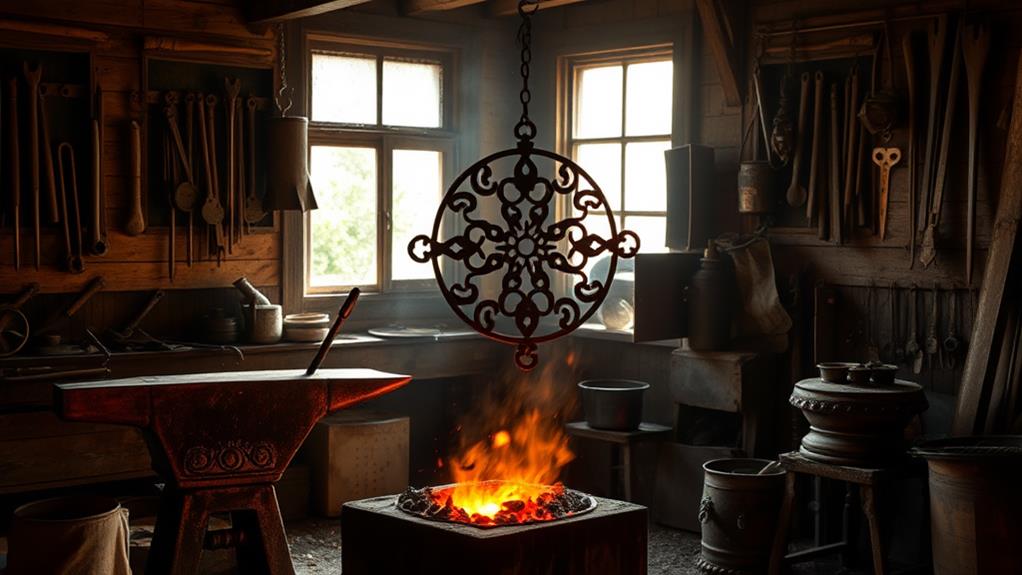
Smith is one of the most recognizable last names in Britain, embodying a rich legacy tied to craftsmanship and trade. When you hear the name Smith, you might think of blacksmiths, who forged tools and weapons, or perhaps silversmiths, known for their exquisite creations. This surname dates back to Old English, where it meant "one who works with metal," reflecting the important role of these craftsmen in society.
As you explore the history of the Smith name, you'll discover it's one of the most common surnames in the UK. It symbolizes hard work and dedication, traits that many people admire. Many well-known Smiths have made their mark in various fields, from literature to sports, showcasing how this name transcends generations.
If you're considering using Smith as a last name for your character in a story or even for your own family name, you're choosing a name that carries weight and significance. It's a name that connects you to a long tradition of skilled artisans.
Johnson
Heritage plays a significant role in understanding the surname Johnson, which has deep roots in British history. This last name is derived from the given name John, meaning "God is gracious" in Hebrew. Over time, it evolved into a patronymic surname, indicating "son of John."
You'll find Johnson as one of the most common surnames in England, with its popularity spreading throughout the English-speaking world.
What's fascinating is how the name reflects a sense of belonging and identity. Johnsons can trace their ancestry back through generations, often linking families to specific regions or historical events in Britain.
Whether you're exploring your family tree or simply curious about the name, there's a rich tapestry of stories tied to Johnson.
You may even come across notable figures with this surname, from politicians to athletes, showcasing the diverse paths Johnsons have taken throughout history.
If you're considering using this surname for your characters or yourself, know that it carries a heritage steeped in tradition. It's a name that speaks to family connections and the enduring legacy of those who came before us.
Isn't it exciting to think about the stories behind such a classic name?
Williams

The surname Williams, like Johnson, has its roots in the patronymic tradition, deriving from the given name William, which means "resolute protector" in Old German. This name has been popular for centuries, and it's easy to see why. When you hear "Williams," you might think of strength and reliability.
In Britain, the name became widespread during the Norman Conquest, as many Williams settled in England. It's fascinating how this surname has evolved over time.
Today, you'll find it not only in England but also in many English-speaking countries around the world. The name carries a sense of history and connection, linking you to a lineage that spans generations.
If you're considering using Williams for a character in a story or naming a child, you'll be tapping into a name that conveys resilience and loyalty.
Plus, it's versatile! You can pair it with various first names, and it flows beautifully.
Brown
Brown is a surname that often evokes a sense of familiarity and warmth. It's one of the most common last names in the English-speaking world, and its origins are quite interesting. The name Brown likely comes from a nickname related to color, describing someone with brown hair or skin. This connection to physical traits makes it relatable and easy to remember.
You might find that many famous individuals carry the surname Brown, ranging from athletes to authors. This popularity has helped the name endure over the centuries, and it's often associated with a sense of reliability and strength. When you hear "Brown," it might remind you of a friendly neighbor or a dependable friend.
In the context of British history, the name has roots that stretch back to medieval times. Families with the surname have been recorded in various regions, showcasing its widespread use.
If you're considering using Brown as a character name in a story or perhaps as a surname for your own family tree, it certainly has a strong and approachable vibe. Overall, Brown embodies a sense of community and connection that many people cherish.
Jones
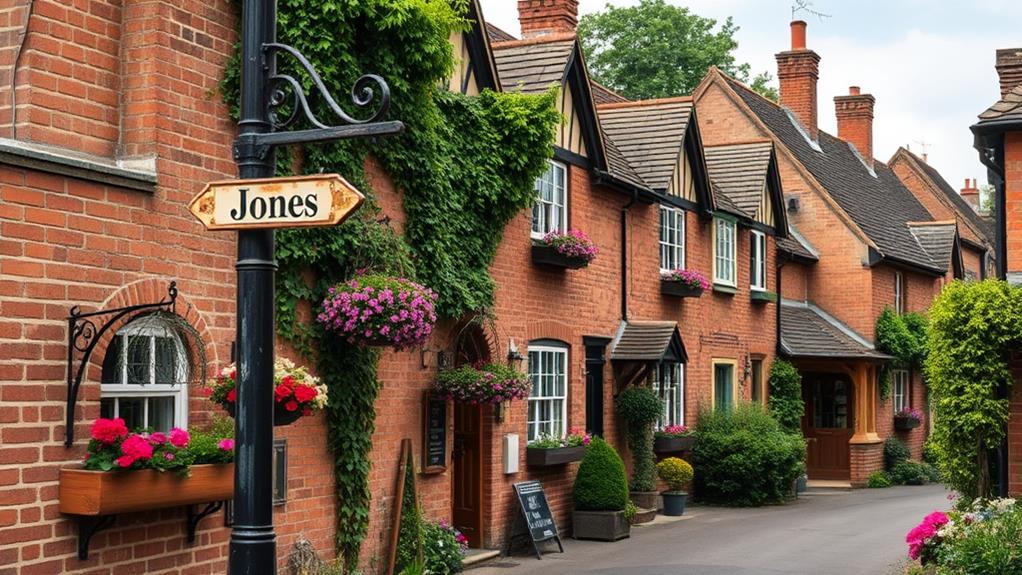
When you think of classic British last names, Jones likely comes to mind as one of the most recognizable. This surname has deep roots in British history, derived from the name "John." Many people with the last name Jones can trace their ancestry back to the medieval times when surnames began to become common in England.
You might be surprised to learn that the name has been used in various forms across the British Isles, including Wales and Ireland.
Jones isn't just common; it's also versatile. You'll find it in many professions, from artists to athletes, reflecting a wide range of achievements. The name has a friendly, approachable feel, making it popular among families.
If you're considering using the name Jones, whether for a character in a story or even for yourself, you're embracing a legacy that's rich with tradition and familiarity.
Additionally, Jones captures a sense of community. Many people share this last name, which can create a feeling of connection among those who bear it.
Taylor
Taylor is another classic British last name that has stood the test of time, often associated with craftsmanship and skill. The name originally comes from the Old French word "tailleur," meaning "to cut." You might find it interesting that it was commonly given to people who worked as tailors, creating beautiful garments for others.
Over the years, the name has evolved, but its connection to artistry and quality remains strong. When you hear the name Taylor, you might think of famous figures, like the beloved singer-songwriter Taylor Swift, or even historical icons. This last name can be found all over the world, especially in English-speaking countries, reflecting its widespread appeal.
Using Taylor as a last name can give a sense of tradition and elegance. It's a name that carries a rich history, making it a fantastic choice for characters in stories or even for your own family tree.
Whether you're exploring your ancestry or just love classic names, Taylor offers a blend of craftsmanship and charm that's hard to resist. So, if you're considering a name steeped in history, Taylor might just be the perfect fit for you!
Wilson

Exploring the origins of the last name Wilson reveals a lineage steeped in history and significance. This surname is believed to derive from the name "William," which means "resolute protector." So, when you encounter someone with the last name Wilson, you're connecting with a rich heritage that speaks to strength and determination.
Wilson is a patronymic surname, meaning it originally indicated "son of William." It gained popularity in England and has roots in various regions, especially in northern England.
You'll find it across the globe today, thanks to migration and the spread of the British Empire.
Interestingly, Wilson isn't just a common last name; it's also found in notable figures throughout history, from politicians to athletes. This adds a touch of prestige to the name.
If you're considering using Wilson for a character or even as a baby name, you're tapping into a tradition that values bravery and leadership.
Davis
Heritage plays a significant role in understanding the last name Davis, which has Welsh origins and derives from the name "David," meaning "beloved." This surname is patronymic, originally indicating "son of David," and has been widely adopted across England and Wales.
When you think of the name Davis, you might picture a strong family lineage and a proud history. It's a name that carries a sense of warmth and affection, reflecting its meaning.
In addition to its beautiful roots, the name Davis has become quite popular in modern times. You may notice it appearing in various forms of media, from literature to film, which adds to its charm and familiarity.
Many famous individuals bear this surname, contributing to its legacy.
If you're considering using the name Davis for a character in a story or even for a baby name, it's a fantastic choice. It's timeless, easy to pronounce, and has a rich background.
Miller
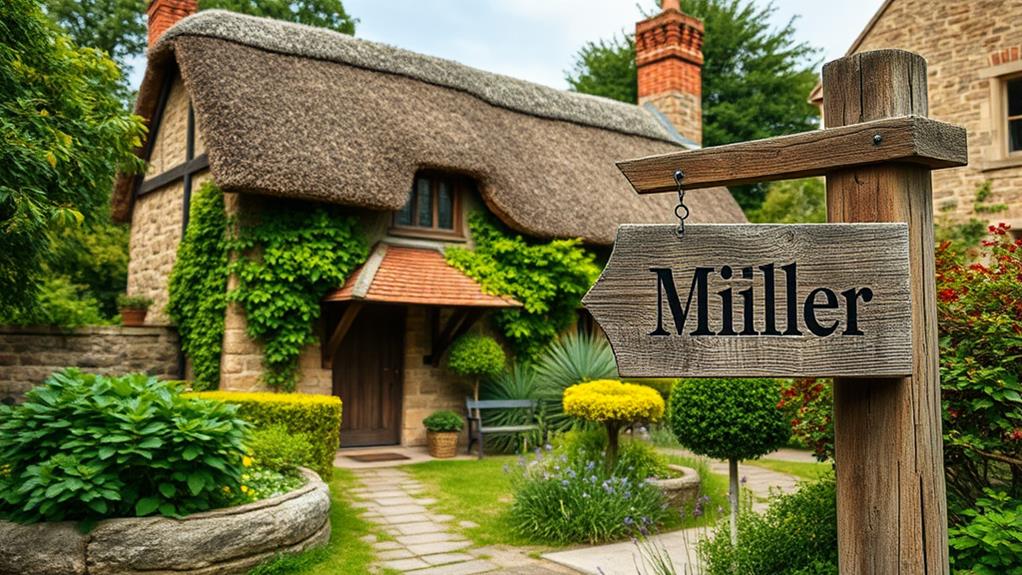
Throughout history, the last name Miller has roots deeply embedded in the agricultural landscape of England and beyond. This surname originates from the Old English word "mylen," which means "mill." If your last name is Miller, it likely reflects the important role your ancestors played in food production. They were the ones grinding grain into flour, a task crucial for sustaining communities.
Miller is a classic British surname that carries a sense of tradition and heritage. It's fascinating to think about how many generations of Millers would have worked tirelessly in their mills, providing essential resources for their neighbors.
The name has been adopted by various families across the globe, emphasizing its widespread appeal. As you explore your own family history, you might discover stories of resilience and hard work connected to the Miller name.
Using this surname can evoke a sense of pride, linking you to a rich agricultural past. Whether you're considering names for characters in a story or thinking of names for future generations, Miller stands out as a strong and meaningful choice that reflects heritage and industriousness.
Moore
Moore is a surname that has stood the test of time, with its origins tracing back to the Old French word "morer," meaning "moor" or "swamp."
This last name often indicates a connection to the landscape, suggesting that your ancestors may have lived near or farmed on moorland. It's fascinating to think about how these geographic features shaped your family's history and identity.
The Moore surname is quite common in Britain and carries with it a rich heritage. Families with this name can be found in various regions, often linked to rural settings.
When you hear the name Moore, you might imagine vast, open spaces, where people thrived amidst nature's challenges.
Many notable figures bear this surname, including writers, politicians, and athletes, showcasing the diversity of talents among those named Moore.
If you have this surname in your family tree, you can take pride in its long-standing significance.
Jackson
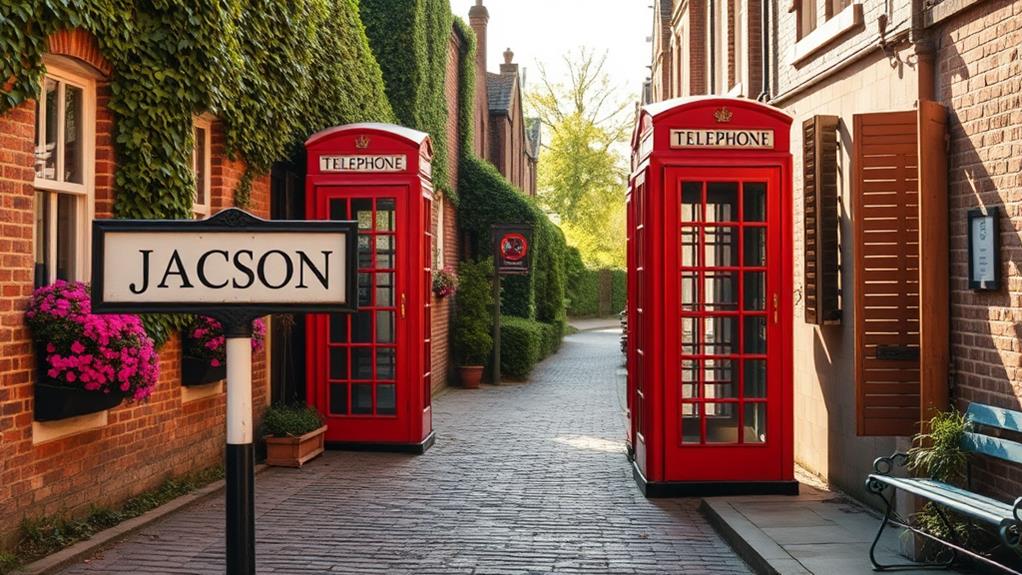
Jackson is a surname that has deep roots in English history, with its origins believed to derive from the medieval given name "Jack," which itself is a diminutive of "John."
This last name signifies "son of Jack" or "son of John," indicating a patronymic tradition common in British surnames. You might find it fascinating that the name has been popular for centuries and has spread beyond the UK, appearing in various cultures worldwide.
As you explore the name Jackson, you'll notice its versatility. It can be used as both a first name and a surname, making it quite popular in modern times.
Many famous individuals carry this name, ranging from musicians like Michael Jackson to actors such as Samuel L. Jackson. This connection to notable figures adds an intriguing layer to the name's appeal.
If you're thinking of using Jackson for a character, a child, or even for yourself, you're tapping into a name that embodies both tradition and contemporary resonance.
It carries a sense of strength and familiarity that people appreciate, making it a classic choice with lasting charm.
White
White is a surname that carries a rich historical significance in Britain, often associated with the color itself, symbolizing purity and brightness. You might find it interesting that this name has deep roots, dating back to medieval times. It originally described someone with fair hair or a light complexion, making it a fitting choice for many families throughout history.
As you explore this name, you'll notice it appears in various forms across different regions. For example, in some areas, you might encounter "Wight" or "Whyte," which are variations that still hold the same meaning.
This surname has also made its way into famous figures, including artists and politicians, showcasing its versatility and enduring appeal.
Today, the White surname is quite common, and if you bear it, you're part of a long tradition. Whether you're tracing your genealogy or simply curious about British names, you'll realize that White captures a sense of elegance and simplicity.
Harris
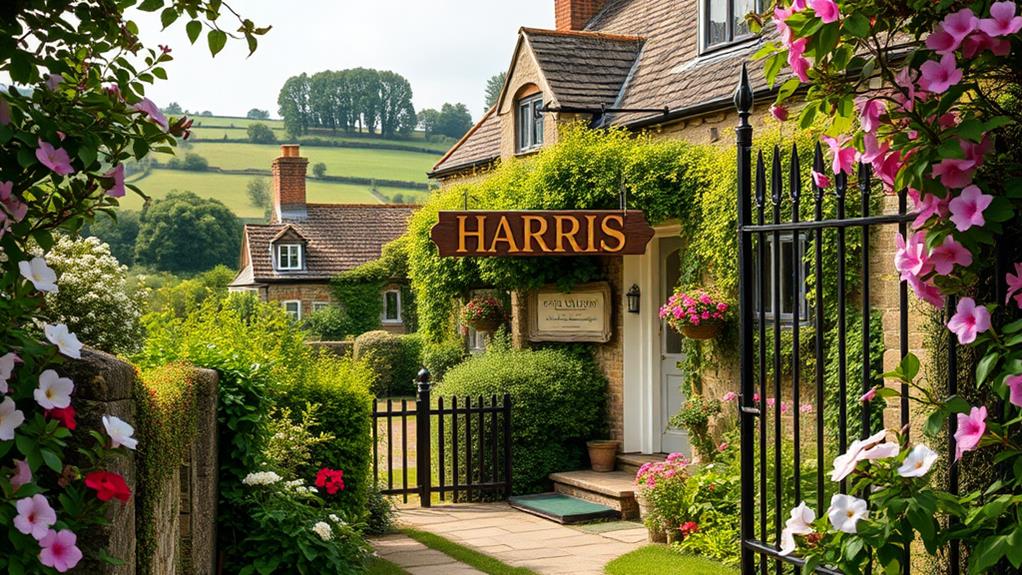
Harris is a surname that carries its own distinct legacy, rooted in the Old English name "Harry," a diminutive of "Henry," which means "home ruler." This name has evolved over centuries, often associated with strength and leadership.
You might be surprised to learn that Harris is one of the most common surnames in England, with a rich history that dates back to medieval times.
As you explore the name, you'll find that Harris has connections to various notable figures throughout history, from politicians to athletes. This surname evokes a sense of tradition while remaining relevant in modern times.
If you're considering using Harris for a character in a story or even for your own family name, you'll appreciate its strong connotations. It suggests a person who's dependable, authoritative, and grounded.
Many families today proudly carry the Harris name, celebrating their heritage and the qualities it represents.
Martin
Martin is a surname steeped in history, derived from the Latin name "Martinus," which means "of Mars" or "warlike." Its association with the Roman god of war lends the name a sense of strength and valor.
This surname has been popular in Britain for centuries, tracing back to medieval times. You might even find it among famous figures, like the renowned artist and writer, Martin Amis.
When you think of the name Martin, you can imagine a strong and reliable person, someone who stands firm in their beliefs. It's a name that carries a rich legacy, often passed down through generations.
Because of its historical roots, you might find it in various forms across different cultures, showing how versatile and enduring it is.
If you're considering using Martin as a last name, you're choosing one with character and significance. It's perfect for anyone looking to connect with their heritage or simply appreciate a classic name.
Whether you're naming a character in a story or looking for a surname to use, Martin can add depth and history, making it a fantastic choice for many contexts.
Thompson
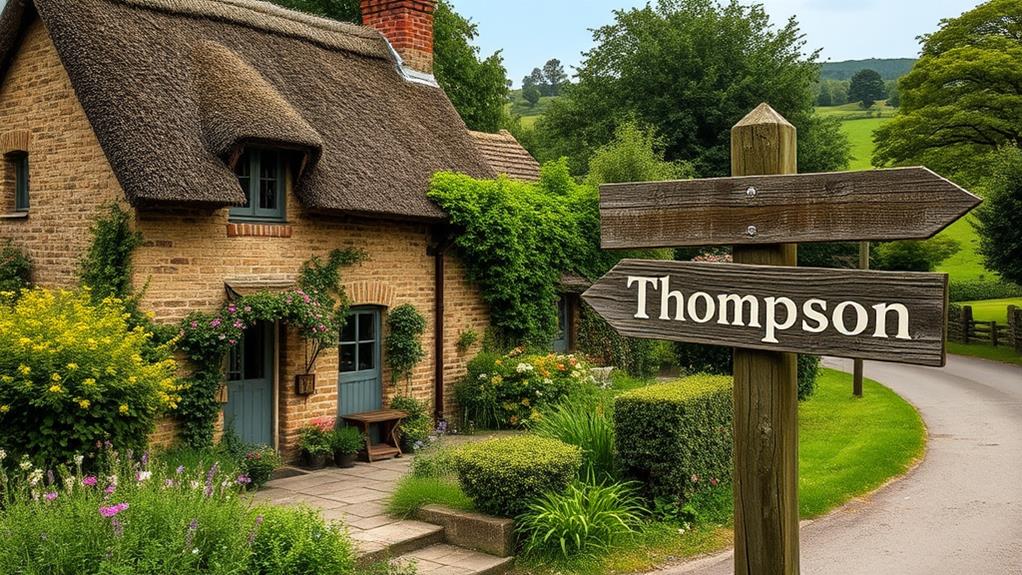
Thompson is a surname that often evokes images of strength and reliability. This classic British last name has roots that date back to the medieval period. It originally meant "son of Thomas," a popular name derived from the Aramaic word for "twin." If you carry the Thompson surname or know someone who does, you might appreciate its rich history and meaning.
Throughout the years, the Thompson name has been associated with many notable figures. From athletes to writers, it's a name that stands out in various fields. You might even find that it appears in your favorite stories or movies, adding a touch of familiarity to characters you love.
Using Thompson as a last name can give a sense of tradition and heritage. Whether you're naming a character in a story or considering it for your own family, it carries a weight of history that many appreciate.
Plus, it rolls off the tongue nicely, making it pleasing to hear and say. So, if you're looking for a classic name with a strong presence, Thompson is definitely worth considering. Its timeless appeal is sure to resonate with many!
Robinson
Many people might recognize the last name Robinson as a symbol of resilience and determination. This classic British surname has a rich history that dates back to medieval times. It originally comes from the given name "Robin," a diminutive of "Robert," meaning "bright fame." The name has been associated with strength and bravery, making it a popular choice among families.
You might find it interesting that Robinson has roots in various regions of England, particularly in the North. Over time, the name has evolved, and you'll often see it spelled in different ways, such as Robins or Robeson.
This surname has been carried by many notable figures throughout history, including famous authors, politicians, and athletes.
Using Robinson as a last name can evoke a sense of pride and heritage. It's a name that stands out, yet it feels familiar and approachable.
If you're considering Robinson for your family or even as a character name in a story, you're tapping into a legacy that celebrates perseverance and strength. So, whether you're embracing it for personal reasons or creative inspiration, Robinson is a name that truly resonates.
Clark

Following the legacy of names like Robinson, the surname Clark carries its own unique significance and history. This name has roots in Old English, derived from the word "clerc," meaning a cleric or scholar. So, if you've ever wondered about your family's connection to education or the church, Clark might be a clue!
Throughout history, many Clarks were educated individuals, often serving as scribes or teachers. This association lends the name a certain prestige and respectability, which you might appreciate if you're considering using it in your own family.
Clark has also made its mark across various cultures and countries, showcasing its versatility. In Britain, it's a common surname, but you'll also find it in America and Australia, where many families have adopted it.
If you're thinking about using Clark as a last name for your characters or even your future children, you'll find it's both classic and timeless. Plus, it's easy to spell and pronounce, making it a practical choice.
With its rich heritage and strong connotations, the name Clark is sure to stand out, whether on a family tree or in a story.
Lewis
With roots tracing back to the Old French name "Louise," the surname Lewis carries an air of nobility and tradition. This name has been a staple in Britain for centuries, often associated with strength and leadership. When you hear "Lewis," think of a family that values heritage and dignity.
The popularity of the name has led it to be found in various regions, creating a rich tapestry of stories and histories. Many notable figures have borne the name, including famous writers and scientists. You might recognize C.S. Lewis, the beloved author of "The Chronicles of Narnia," who brought magic to countless readers.
Having the surname Lewis might make you feel a connection to this legacy of creativity and intellect. As you explore your own family tree, you may discover fascinating tales from your ancestors that add depth to your understanding of the name.
If you're considering using Lewis as a surname for your characters in a story or even for naming a child, you're embracing a name that stands for resilience and tradition. It's a choice that reflects both a rich past and a promising future.
Walker
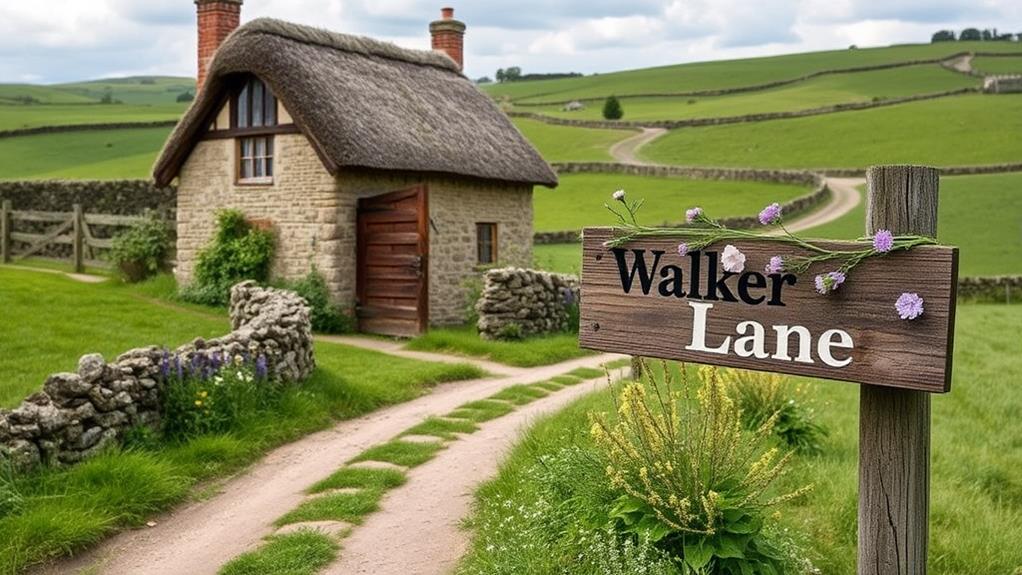
The surname Walker evokes images of movement and journey, rooted in the Old English term for someone who walked or traveled. This name carries with it a sense of adventure, suggesting a lineage of explorers or wanderers. When you think of the Walkers, you might imagine a family that values exploration and discovery, always seeking new paths and experiences.
Historically, the name Walker was often associated with those who worked in the cloth industry, specifically fulling cloth by trampling it in water. This connection to craftsmanship adds another layer to the name's rich history. Imagine being part of a family that contributed to the textile trade, helping shape the economy of your community.
In modern times, the surname Walker remains popular and is frequently found across the English-speaking world. It's a name that feels both traditional and contemporary.
If you're considering using this surname, you're tapping into a legacy of movement, creativity, and hard work. Whether you're a Walker by birth or simply appreciate the name, it's an excellent choice that carries with it a sense of history and purpose.
Hall
As you explore the world of classic British surnames, Hall stands out with its rich history and significance. This name has deep roots, originating from the Old English word "heall," meaning "a large house" or "manor." It often referred to someone who lived or worked in a hall, which was a central place of gathering in medieval times.
You might find it interesting that Hall is quite common across England, and it has various notable figures associated with it, including artists, scholars, and politicians. The name carries a sense of tradition and stability, making it a great choice if you're looking to connect with history.
Whether you're considering using Hall as a last name for a character in a story, or you're simply curious about its background, it embodies a connection to the past.
You'll also notice that it pairs well with many first names, giving it a timeless appeal.
In today's world, Hall remains a popular surname, reflecting its enduring legacy. So, the next time you come across this name, you'll appreciate the story it tells about heritage and identity.
Allen

Allen is a distinguished surname with a fascinating lineage that dates back to the medieval period. Originating from the given name Alan, this surname has roots in Old Breton and means "rock" or "noble."
As you explore the history of the Allen surname, you'll find it associated with various notable figures throughout British history, including poets, politicians, and even military leaders.
You might be surprised to learn that the name Allen has spread beyond the shores of Britain, finding its way into many English-speaking countries. This versatility makes it a popular choice for families seeking a connection to their heritage.
When you think of the name Allen, you may picture a strong, dependable character, someone who stands firm like a rock. Over the centuries, many Allens have made significant contributions to society, embodying values like integrity and resilience.
Whether you're considering using Allen as a last name for your own family or simply appreciating its historical significance, it's clear that this surname carries a legacy worth celebrating.
Young
Young is a surname that carries a vibrant history and an intriguing meaning. The name often refers to someone who was younger than others in their family or community. It's an interesting way to highlight a person's place within a larger family or social structure. Originally, this surname could have been used as a term of endearment or respect, showcasing a connection to youth and vitality.
You might be surprised to learn that the Young surname has roots in both English and Scottish cultures. It's been around for centuries, appearing in various historical records and documents. Many notable figures throughout history have carried this name, contributing to its rich legacy.
If you're considering using Young as a last name, it's a fantastic choice that resonates with a sense of freshness and energy. It suggests a spirited personality, making it appealing for characters in stories or even for your own family name.
Plus, it's easy to pronounce and remember! So whether you're exploring genealogy, writing fiction, or simply curious, embracing the Young surname can add a lively touch to your narrative or identity.
King

With a regal air and a commanding presence, the surname King evokes images of nobility and leadership. This classic British last name has deep roots, often associated with historical figures and royal lineage. Carrying the name King could make you feel like you're part of something grand, as it's tied to the concept of authority and respect.
Historically, the surname originated from the Old English word "cyning," meaning "king" or "ruler." It's fascinating to think about how this name has been passed down through generations, linking families to a legacy of strength and power. If you have this surname, you might feel a sense of pride, knowing that many Kings have played vital roles in shaping history.
In modern times, the surname King remains popular and is embraced by many. It represents not just an aristocratic past but also a strong identity.
Whether you're writing a story, creating a character, or simply exploring your heritage, the name King can add a touch of elegance and significance. So, if you're considering using this classic surname, you're choosing a name that carries weight and history, making your choice all the more special.
Scott
Embracing the surname Scott connects you to a rich tapestry of history and culture. Originating from Scotland, this name has strong ties to the Gaelic word "scotta," meaning "the man from Scotland." If you carry the name Scott, you're part of a legacy that dates back centuries, with many notable figures sharing this surname.
The Scott name is often associated with bravery and resilience, qualities that many admire. Famous Scots, like Sir Walter Scott, the renowned author, and Robert the Bruce, a national hero, have helped shape Scotland's narrative.
By adopting this surname, you're not just using a name; you're honoring a heritage filled with inspiring stories and achievements.
In modern times, Scott is a popular last name across the globe, often symbolizing a sense of pride and identity. Whether you're exploring your family history or simply appreciate the name, Scott offers a connection to something greater.
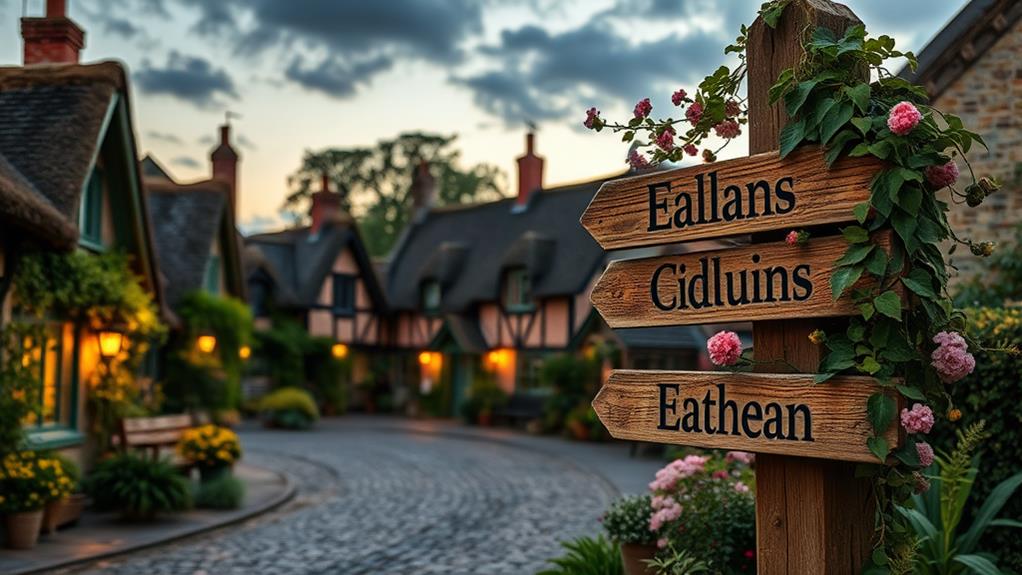










Post Comment